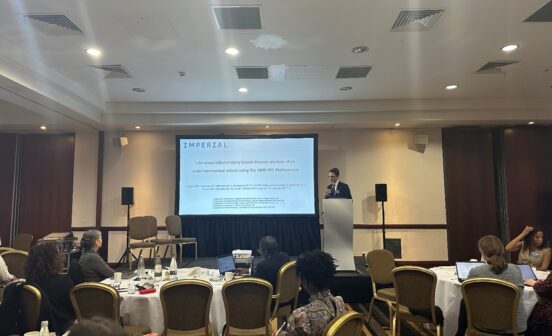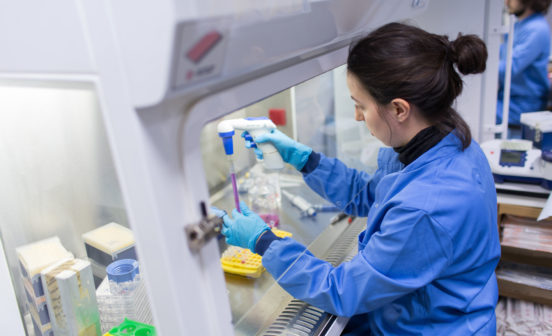Gastrointestinal (GI) disorders account for 20% of primary care consultations and are important drivers of mortality, morbidity, and escalating healthcare cost. We are focused on exploring both Inflammatory Bowel Disease (IBD) and chronic liver disease (CLD) in the north west London using cutting-edge, multi-omic approaches.
Why this Research is Needed
The GI tract is home to over 40 trillion bacteria, which together with communities of fungi and viruses, is known as the microbiome. Disturbance of the microbiome and host-microbe interactions underlie many GI and liver diseases, mediated through loss of gut barrier function, dysregulation of immune function, disruption of metabolism and carriage of pathobionts. Experimental probing and manipulation of this ecosystem is key to improving patient outcomes. The Digestive Diseases Theme will leverage unique local expertise and convergence science opportunities to address five areas of GI/liver disease which arise from disorders in the intestinal microbiome.
Theme Aims
The Digestive Diseases theme will explore the following areas of research
- Colonisation with antibiotic resistant bacteria in vulnerable patients
- Movement of microorganisms from the gut into the host, due to impaired gut integrity
- Precision medicine to guide treatment in inflammatory bowel disease using host-microbiome profiling
- Precision medicine in liver disease
- Testing novel treatment strategies and premorbid diagnostics in cancer drug induced colitis and hepatitis
Detailed Theme Objectives can be found here.
Upcoming /Ongoing Projects within the Theme
Colonisation with multi-drug resistant organisms (MDRO) in vulnerable patients: Working with haemato-oncologists, we have shown that we can rescue gut microbiota diversity and reduce MDRO colonisation prior to hematopoietic cell transplant. This prehabilitation of the gut microbiota has been shown to have significant and wide health benefits. We will evaluate intestinal microbiota transplantation (IMT) to boost and rescue colonisation resistance in the gut microbiome of patients with cirrhosis, renal failure and diabetes – all patient groups in which there are reported very high levels of MDRO colonisation of the gut.
Translocation of microorganisms due to impaired epithelial integrity: Gut-barrier dysfunction is an important therapeutic target in IBD, CLD and cancer patients receiving immunotherapies. We will use IMT to improve gut barrier function or control pathobionts. Novel monitoring techniques deploying fluorescence-based, point-of-care gut integrity assays will be used to monitor the therapeutic impact in patients IBD, Alcoholic Liver Disease (ALD) and checkpoint inhibitor complications.
Precision medicine to guide treatment in IBD using host-microbiome profiling: Despite multiple advanced therapies for IBD, fewer than 50% of patients achieve durable mucosal healing. Using our knowledge of host immune function and molecular stratification tools, we will integrate multi-modal ‘omics data, from profiling the microbiome, metabolome and host transcriptome, to prospectively stratify patient responses to advanced therapies and develop much needed precision medicine approaches. In addition to testing our stratification tools in local cohorts, validation will be performed with key industry partners (Abbvie, Janssen, BMS, AZ), using ‘omics data collected in their landmark phase three and early phase clinical trials.
Precision medicine in Alcoholic Liver Disease (ALD): Building on our research in ALD, acute liver failure and acute decompensation, we will test strategies to restore protection against infection, which will overlap with the microbiome-based therapies including manipulation of the gut microbiome gut-barrier axis. Working with the Molecular Phenotyping Theme, we will extend precision medicine approaches to liver disease research in ALD and non-alcoholic fatty liver disease (NAFLD). The aim is to develop precision-based digital tools, to tailor treatment options to patients.
Test novel treatment strategies and premorbid diagnostics in checkpoint inhibitor induced colitis and hepatitis: Immune checkpoint inhibitors (CPI) are changing treatment paradigms in cancer, but often cause severe immune mediated inflammatory diseases, like IBD and autoimmune hepatitis, which leads to CPI withdrawal and hospitalisation. Based on preclinical observations we will test novel therapeutics (e.g. anti-IL-23) to alleviate disease without adversely impacting cancer outcomes or infection risk. Identification of the pre-disposing microbial communities, their associated metabolome, and the host response to their colonisation, offers novel opportunities for early (or even pre-morbid) diagnosis, and microbiome-based therapeutics.
Pilot Projects
Following an open call in the summer of 2023 the following pilot projects were funded from the Theme:
- Harnessing transcriptomics as a precision medicine tool to predict response to anti-TNF treatment in perianal Chron’s disease – Dr Domenico Cozzetto
- Designing a targetable panel of immune pathways to treat checkpoint inhibitor-induces hepatitis – Dr Cathrin Gudd
- Harnessing the mucosal transcriptome to deliver precision medicine in inflammatory bowel diseases – Dr Mohammad Saifuddin
- Spatial multi-omics to explore immunometabolic heterogeneity in nonalcoholic steatohepatitis-related hepatocellular carcinoma – Dr Zoe Hall
Patient and Public Involvement, Engagement and Participation
Working with the public is vital to the success of our work, in particular for helping us to understand how our research can be translated for the benefit of patients. We work with patients in various ways, including involving them in the design of our clinical studies and actively engaged in public outreach events to disseminate our work to wider audiences.
We have convened a patient and public involvement, engagement and participation group which includes patients with lived experiences of the diseases that we wish to impact.
Equality, Diversity and Inclusion
The Digestive disease theme’s EDI follows the five underpinning principles of our BRC: measurable, proactive, informed, reflective and equitable. In addition to ensuring all our staff complete their EDI training, we have also started recording EDI data in recruitment to monitor the demographic of applicants and ensure we are attracting a varied cohort of candidates.
We have been proactive in funding translation of patient consent forms and information sheets into different languages used by our local communities, including Arabic, Bengali, Gujarati, Hindi, Punjabi and Tamil, to facilitate greater inclusion of patients into studies from the north west London population.
Our Community Partners
In accordance with the Imperial BRC’s PPIEP Strategy , our theme has recruited a group of Community Partners to act as critical friends to our theme and share their valuable lived experience with our researchers and health professionals to help improve the relevance and quality of our research for the benefit of our North West London population.
Key Individuals
-
Professor Julian Marchesi
Professor of Digestive Health - Co-Theme Lead -
Professor Mark Thursz
NIHR Imperial BRC Director -
Professor Nick Powell
Professor in Gastroenterology - Co-Theme Lead -
Dr Alex Thompson
Lecturer in Sensing in Cancer -
Dr Benjamin Mullish
Clinical Lecturer -
Dr David MacIntyre
MRC-CDA Fellow & Lecturer in Reproductive Systems Medicine -
Dr Evangelos Triantafyllou
Lecturer in Liver Immunology -
Dr Horace Williams
Clinical Senior Lecturer -
Dr Isabel Garcia-Perez
Lecturer in Precision & Systems Medicine -
Dr James Maurice
Clinical Research Fellow -
Dr Jia Li
Reader in Biological Chemistry -
Dr Jiri Pavlu
epartment of Immunology and Inflammation -
Dr Jonathan Hoare
Consultant Gastroenterologist -
Dr Jonathan Swann
Senior Lecturer in Microbiomics and Human Development -
Dr Julie McDonald
Lecturer -
Dr Lesley Hoyles
MRC Intermediate Fellow in Data Science -
Dr Lucia Possamai
Consultant Hepatologist and Honorary Clinical Senior Lecturer -
Dr Nikihl Vergis
Clinical Senior Lecturer -
Dr Phil Tozer
Consultant Colorectal Surgeon -
Dr Pinelopi Manousou
Honorary Clinical Senior Lecturer -
Dr Sam Au
Senior Lecturer -
Dr Sarah Butcher
Head of Bioinformatics Support Service -
Dr Simon Peake
Consultant gastroenterologist -
Dr Tamas Korcsmaros
Senior Lecturer in Intestinal Epithelial Biology -
Dr Tamir Rashid
Clinical Reader in Liver Regeneration -
Dr. Joram Posma
Research Associate -
Professor Ailsa Hart
Professor of Practice -
Professor Elaine Holmes
-
Professor Gary Frost
Chair in Nutrition & Dietetics -
Professor Huw Thomas
-
Professor Kevin Murphy
Professor of Endocrinology & Metabolism -
Professor Marc-Emmanuel Dumas
Reader in Translational Systems Medicine -
Professor Robert Glen
Chair in Computational Medicine -
Professor Rongjun Chen
Professor of Biomaterials Engineering -
Professor Stella Knight
Senior Research Investigator -
Professor Timothy Orchard
Professor of Gastroenterology








































